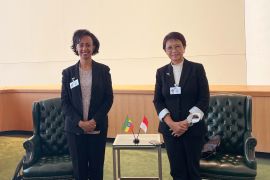Most of the 4,200 Ethiopian troops in Abyei have been in the territory on the border between north and South Sudan for less than a week.
The Khartoum government, whose forces had occupied the village where the explosion occurred, is a signatory to the Ottawa treaty banning the use of anti-personnel mines.
A UN peacekeeping spokesman said the seven injured had been airlifted to Kadugli, main city in the Sudanese state of South Kordofan where there is a UN medical facility.
Three of them were in a critical condition, according to UN sources in Sudan.
The landmine detonated in the village of Mabok, around 30 kilometres (20 miles) southeast of the territory`s main town of Abyei.
The village had been occupied by north Sudanese forces.
The UN Security Council approved the sending of the Ethiopian peacekeeping force to Abyei on June 27 in a bid to douse tensions ahead of South Sudan split from the north.
The Ethiopian peacekeepers were to monitor the withdrawal of north Sudan troops who overran Abyei and its surrounds on May 21. More than 100,000 ethnic southerners fled to the south after the offensive.
UN Secretary General Ban Ki-moon said he was "saddened" by the deaths.
"The secretary general expresses his deepest condolences to the families, friends and colleagues of those killed, as well to the government of Ethiopia," said UN spokesman Martin Nesirky.
"He also expresses his concern for the well-being of the seven other peacekeepers who were injured in the explosion."
The northern occupation of Abyei in May scuppered any chances of north and south reaching political agreement on the future status of the bitterly contested border region ahead of southern secession last month.
It remains the the most sensitive outstanding issue that Juba and Khartoum have yet to resolve, alongside the management of the divided country`s oil assets. (*)
Editor: Kunto Wibisono
Copyright © ANTARA 2011









